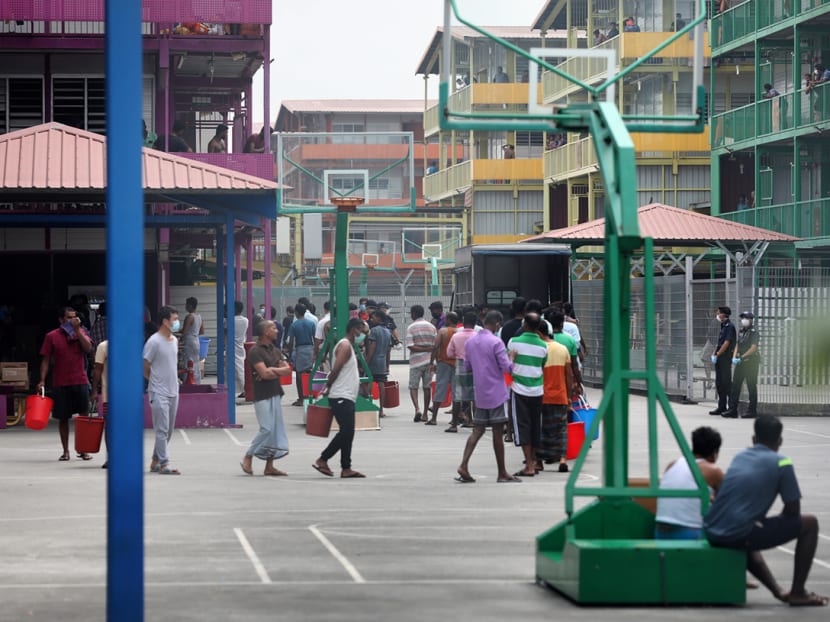Panellists call for Govt to rethink reliance on foreign workers, ‘fear of social responsibilities’, as Covid-19 exposes shortcomings
SINGAPORE — A panel consisting of academics and other prominent social commentators believe that the Covid-19 pandemic is challenging some of the Government’s “sacred cows”.
SINGAPORE — A panel consisting of academics and other prominent social commentators believe that the Covid-19 pandemic is challenging some of the Government’s “sacred cows”.
These include the country’s addiction to cheap, transient labour and what the panelists described as the policymakers’ “fear of social responsibilities” and the idea that they hold “the monopoly of wisdom”.
The panellists included Nominated Member of Parliament (NMP) Walter Theseira, an associate professor of economics at the Singapore University of Social Sciences; Associate Professor of Law Eugene Tan from the Singapore Management University who is a former NMP; National University of Singapore sociologist Chua Beng Huat; former NMP Viswa Sadasivan; and veteran architect Tay Kheng Soon.
They were speaking on Friday (May 15) at a virtual panel discussion on the topic, “What are the sacred cows that Covid-19 might force us to reconsider?” The event was co-hosted by Yale-NUS College-based student organisation Community for Advocacy and Political Education (Cape) and the Singapore Policy Journal, a student-run journal at the Harvard Kennedy School.
During the discussion, Mr Sadasivan, who is the chief executive officer of consultancy firm Strategic Moves, said the time has come to seriously relook the economic growth model Singapore has been used to.
“We are really substituting quality for relatively cheap foreign labour, and that is how our GDP (gross domestic product) has been pushed,” he said, pointing out that there were about 60,000 foreign workers in the 1960s but close to 1.5 million of them today.
This reliance on foreign labour was a problem that was identified by a 2009 economic strategies committee chaired by then-Finance Minister Tharman Shanmugaratnam, but “the needle hasn’t shifted” and productivity remains low, he added.
Mr Sadasivan continued: “If you look at it carefully, the wage component of our GDP is exceptionally low… at about 40 per cent. If you compare this to the average of OECD (Organisation for Economic Co-operation and Development) countries, that’s about 50 per cent. Several other developed countries are talking about 55, 56 per cent.
“Now we are at 40 per cent, which is even lower than Hong Kong. So as long as we continue with this model, we are going to have serious problems.”
The reliance on foreign workers has also depressed the wages of low-income workers here, Prof Chua pointed out.
He also felt that the Government had not been taking on the social responsibility that comes with the reliance and had instead delegated the foreign workers’ welfare to employers.
He added that the Government should have at least recognised that something needs to be done when a thousand violations are found each year in relation to foreign worker accommodation.
Manpower Minister Josephine Teo had said in Parliament on May 4 that every year, an average of 1,200 employers are taken to task for providing unacceptable accommodation under the Employment of Foreign Manpower Act.
“The most you do is to haul the abusers to court, rather than put in legislation that would actually guarantee and protect their rights,” Prof Chua said.
Assoc Prof Tan believed that society has become immune to the foreign worker situation as there had been a fixation on assessing each person based on his economic worth.
“My concern is that if we can treat a segment of our society like that, it could mean that that sort of discrimination can go easily to another segment of our society,” he said.
Related to this point, Prof Chua argued that it is time for Singapore to get rid of some myths about itself. “We really believe too much in what we constructed about our own success story,” he said.
Mr Sadasivan added that as a society, “everything is predicated on dollars and cents”.
“I am not a communist. I am not a socialist. I am saying that at the end of the day, we need to be able to say: ‘Enough is enough’,” he said.
“It is something that we need to think hard about. How much money do we really need to be content? How much is necessary?... I think the Scandinavian countries are highly respected in many parts of the world because there is contentment in society. There is no need to flourish their lives with all kinds of expensive stuff, expensive cars, expensive homes.”
He suggested for the higher echelons of society to accept a higher tax rate and be prepared to share a lot more and allow for greater redistribution of wealth in society.
Assoc Prof Theseira said the issues raised by his fellow panellists had made him think harder about the myth of Singapore exceptionalism.
He said: “Exceptionalism is a bad ideology… We should test our ideologies with reference to empirics and success, rather than to just say, ‘Trust us, it has always been done this way.’”
Mr Sadasivan said that more fundamentally, the Government needs to come to terms with the fact that it “really does not have the monopoly of wisdom”.
“We are not saying that the people in Government are not smart,” he said. “No matter how smart you are, no matter which best universities you go to, all of those things don’t count because of the complexity of the kind of problems we are going to be facing.
“We need people from a whole spectrum of abilities to come together and come up with solutions. Today, we are not having that.”












